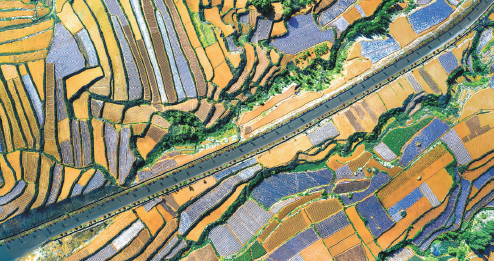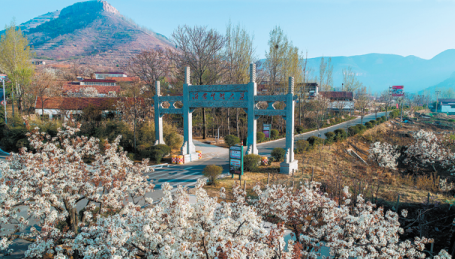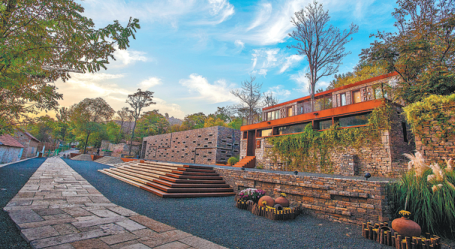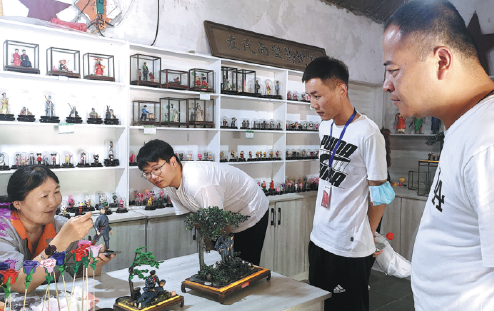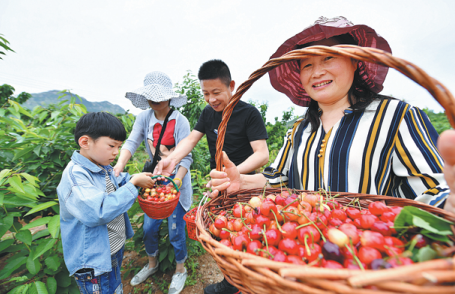'Yimeng spirit' still inspires
Just as it did during wartime, the indomitable character of people in the mountainous region has shone through to help them build a better life and a prosperous future, reports Zhao Ruixue in Linyi, Shandong.
People didn't have enough food, drinking water or basic healthcare resources, elders tell visitors when explaining how underdeveloped the villages in the Yimeng Mountain area in Shandong province once were.
One of the country's old revolutionary bases, nowadays, villages in the mountainous area have witnessed substantial changes as people have embraced the "Yimeng spirit" cultivated during China's struggle for liberation to power the development of their region.
More than 1.2 million of the total 4.2 million population living in the area supported the revolutionary army during the 1930s and '40s, and more than 200,000 of those joined the army.
Their spirit of hard work, self-improvement, selflessness and dedication was later referred to as the "Yimeng spirit", which has since inspired generations of Chinese people to create a better life.
In Linyi, a main city in the Yimeng Mountain area, a total of 451,000 people were lifted out of poverty during the period of the 13th Five-Year Plan (2016-20). The average annual net income of local people increased from 2,566 yuan ($393) in 2016 to 7,481 yuan in 2020.
Lijiazhai, a former backwater village in Linyi's Junan county, has been turned into an affluent, livable place thanks to the efforts of several generations of residents.
Land there was barren and water was scarce. In 1951, led by the village's Party committee members, villagers started to build irrigation facilities and create arable land, reclaiming it from mountains.
"At that time, we didn't have excavators and explosives to make a dent in the mountain. We just used manual labor and brute force, working day and night," says Li Yueqin, 77.
With a decade of effort, the village created over 330 hectares of arable land with high yield of grain.
To increase villagers' income, in the 1990s, the Party committee led villagers to plant cherry trees.
"The net income per capita in our village has increased to 22,000 yuan from 2,000 yuan 20 years ago," says Li Mingcong, Party secretary of the village.
"We are living in buildings equipped with elevators. We have schools, squares and a library," he says.
In September 2019, a high-speed railway reached the Yimeng Mountain area. The railway stops at the village, greatly boosting tourism, says Li Mingcong.
"We are using the Yimeng spirit in the new era to work hard and create a better life. The spirit is alive everywhere around us," he says.
A tourism revolution
Yinan county in Linyi is using its revolutionary resources from China's struggle for liberation in the 1930s and '40s to boost its cultural and tourism development.
There are more than 180 verified revolutionary sites throughout villages of the county, leaving a wealth of revolutionary relics. Among them, one is a national-level site and four are provincial-level, says Yuan Junguo, deputy director of the cultural relic protection center of the county's cultural and tourism bureau.
To protect the revolutionary sites, the county has built a batch of museums and memorial halls. Local government has spent over 700 million yuan developing a tourism area where visitors can try their hands at making local food and handicrafts, and experiencing intangible cultural heritage firsthand, such as paper-cutting and making dough figurines.
During the recent Dragon Boat Festival, hundreds of groups of tourists visited to learn stories of the heroic mothers of Yimeng, a group of women who voluntarily took care of soldiers and their children during the war.
Dong Yanli from Shandong's Qingdao couldn't hold back tears after visiting the houses where the Yimeng mothers once lived.
"I am deeply moved by the touching stories of the Yimeng mothers. I will tell the stories to my children," she says.
One of the subjects of those stories is Wang Huanyu, who was born in 1888. Wang joined the Party in 1938. She founded a wartime nursery to raise unattended children of soldiers in 1939 when the Communist Party of China-led Eighth Route Army settled in her hometown, using it as a revolutionary base.
My grandma felt sorry for the children who moved to the revolutionary base with their parents because their parents needed to focus on the war, leaving the children unattended, says Yu Aimei, Wang's granddaughter.
"So she suggested that villagers take care of the children, believing it to be a way to contribute," says Yu.
Wang asked her daughter-in-law to feed the children of the soldiers who had sacrificed their lives with her breast milk. However, because there was not enough to feed several children, Wang's own grandchildren had to eat coarse grains. Due to the harsh living conditions and extreme poverty at that time, four of Wang's grandchildren died from malnutrition.
Wang's nursery was a home to over 80 children during the war, with the youngest being 3 days old and the eldest around 7 or 8, according to the town officials.
During China's War of Liberation in the late 1940s, six women from Mengyin county in the Yimeng Mountain area, did all they could to support the army off the battlefield. They were named the Six Sisters of Yimeng. They did the cooking, made shoes by hand and washed clothes for soldiers. They also cared the wounded and helped transport provisions and ammunition.
"Their deeds exemplified the Yimeng spirit. That spirit of hard work, selflessness and dedication will never be outdated," says Dong.
To make it easier for tourists to travel between the revolutionary sites, the county has built a 59-kilometer highway which was put into service in 2013. Connecting 26 villages in the mountainous area with the outside world, the road has also become an artery for rural development.
Villagers in Sanshangou village of the county's Tongjing town were once isolated by their location deep in the mountains. In the 1980s, a project by the Food and Agriculture Organization of the United Nations was abandoned because there were no roads that reached the village.
The highway has been instrumental in transporting villagers out of poverty.
"Before, we sold ginger by carrying the crop to market, but the money we earned could only cover the cost of some salt and oil. Now, however, our ginger is being transported all over the country. Buyers now come to our village to purchase our ginger," says Sun Hongwang, a villager from Sanshangou, adding the highway also brings tourists to the village to experience rural life.
Sanshangou was named as a city-level demonstration village of rural tourism in 2016.
"Inspired by the Yimeng spirit, we are creating a much better life," says Sun.
Contact the writer at zhaoruixue@chinadaily.com.cn
